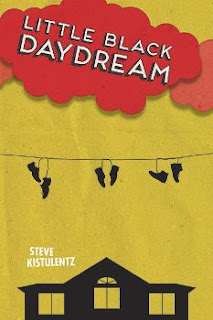75º ~ a slight rising in temps, but still amazingly pleasant for the end of May, bright sun, cool breezes, last weekend's new plants settling in nicely out front
Steve Kistulentz' second book, Little Black Daydream (Akron 2013), is a book filled with American Cold War babies grown into speakers filled with both nostalgia for what was never an innocent childhood and anger, seething beneath the surface, that all the promises of a glorious future failed.
If you recall, I met Steve at the Arkansas Literary Festival last month (although it seems ages ago now). At that reading, I learned that Steve grew up in the shadow of Washington D.C., immersed in the world of politics. While there are only one or two poems in Little Black Daydream that feel at all confessional, all of the poems are infused with polit-speak, the language of government and war, policies and proclamations. With that language, the poems build to an indictment of the early 21st century, of capitalism run amok, of an affliction of excess that has led to a fractured world that cannot be healed. Within the poems, there are references to the "Bureau of Metropolitan Longing," "the directorate," "the secretary of self-effacement," and "the secretary of nostalgia" to name just a handful of examples.
Here are a few titles to demonstrate how politics and nostalgia combine in the book.
The Symbolic Landscape of Your Childhood
Soldiers at Parade Rest
Life During Wartime
Poem that Admits Its Own Defeat
Last of the Soviets
Poem that Cries at the National Anthem
Portrait of You at the Victory Banquet
These are poems, first and foremost, of ideas, the language not focused on being beautiful or on calling attention to itself. Instead, the craft is in the blending of the American vernacular with the religious and the political.
Here is the opening of "Poem That Cries at the National Anthem."
The first act of the national assembly:
proclamation of a new anthem,
We Almost Lost Detroit.
Also, a reconstitution of the rituals of High Mass,
beginning with the resurrection
of the ancient language
no one speaks.
So ordered.
This is one way, these distractions, to hide your crimes.
In "Poem That Admits Its Own Defeat," the speaker attends a wedding and states:
... . We guests
adorn ourselves in Sunday best, all rented
or borrowed or woven out of the flags
of the defeated. What else is a pinstripe
suit anyway? The vows are call and response
written on the back of a Topps baseball card,
and the recessional is the dance remix
of Battle Hymn of the Republic.
I should also note that throughout the book, the poems describe some kind of war/battle fought within America. For example, in "Life During Wartime," the speaker says, "no one saw the tide turning in the Middle West, blood fields / of the republic. After the loyalist routing at Ypsilanti, / the reconstituted government convened show trials." The rust belt, and its demise in metaphor and in reality, lingers behind the scenes of several poems, although for the most part, these poems apply to Anywhere, America.
As I read the book through, I couldn't help flashing back to my own childhood in working-lower-middle-class, white America suburbia (or what passed for it in a small addition of houses surrounded by cornfields outside of town) of the 70s and 80s. Images from the film The Day After (*for you young 'uns, I do not mean the Dennis Quaid movie The Day After Tomorrow) rolled through my mind. The political nature of the poems brought up Carolyn Forche's "The Colonel" and Auden's "The Unknown Citizen."
Little Black Daydream may not be the kind of book that sent me to my journal sparking with language, but it is a book that jolts me into confronting a reality I am often prone to covering up. I feel a solidarity with the speakers in this book; their causes are my causes and their angry nostalgia is my own.

2 comments:
Thanks for the review, Sandy. It sounds like a solid piece of work. I'll have to read it.
John, thanks for reading, as always!
Post a Comment